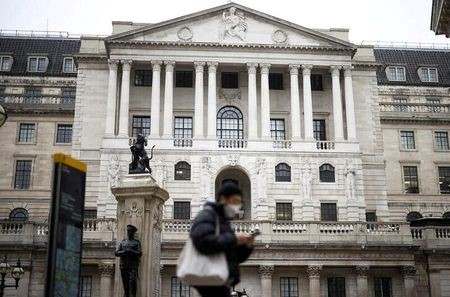




January Economic Update: Growth slows, prices rise
 DOWNLOAD
DOWNLOAD

Inflation Update: Up, up, and away?
 DOWNLOAD
DOWNLOAD

Quarterly Economic Growth Release: Growth takes on a slower pace
 DOWNLOAD
DOWNLOAD


Trading could come under Bank of England climate test scrutiny

By Huw Jones
LONDON, July 8 (Reuters) – Future Bank of England tests of how banks will cope with a net zero economy could focus on specific activities such as trading and also include individual results, a senior official said.
In its first climate-related stress test, the central bank found insurers and banks such as HSBC, Lloyds, Barclays and NatWest could face total losses of 334 billion pounds over three decades if they took no action.nL5N2XG34YnL8N2MR29G
The European Central Bank said on Friday its own test showed a sudden jump in carbon prices coupled with floods and droughts this year would lead to losses of at least 70 billion euros ($71.1 billion) for the euro zone’s largest banks. nL1N2YP0DX
Sarah Breeden, BoE executive director for financial stability and lead on climate change, said bank-by-bank results were a “long term aim”, adding that companies will have time to embed lessons from the first climate test before any changes.
“I want it to be that firms have had an opportunity to be getting better at managing the risk and measuring the risk, rather than just to run it again,” Breeden told Reuters.
Testing for resilience to market shocks became routine after taxpayers rescued banks in the financial crisis, with the next BoE one due in September, with bank-by-bank results in 2023.
Breeden said the first climate test had to make choices by including loan books and excluding trading. A conference will be held later this year on potentially linking climate risks to capital requirements.
“What we can do is think about are there any specific issues that we want to drill down on. Do we want to do something really targeted on trading risk, do we want to do something really targeted on a particular sector?” Breeden said.
Breeden said central banks have not overplayed the risks associated with climate change given the huge sums involved.
“Those are too significant to ignore… it might hit an individual institution much more significantly than others.”
Stuart Kirk, then head of responsible investing at HSBC Asset Management, said in May that central banks spend “way too much time” on climate risk. HSBC said the views were not those of the bank and Kirk resigned on Thursday. nL8N2YO4BX
(Reporting by Huw Jones; Editing by Alexander Smith)
((huw.jones@thomsonreuters.com; +44 207 542 3326; Reuters Messaging: huw.jones.thomsonreuters.com@reuters.net))
This article originally appeared on reuters.com





 By Reuters
By Reuters